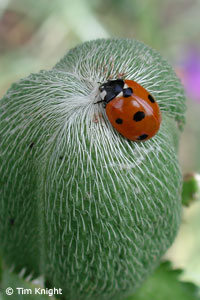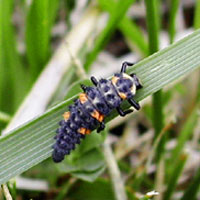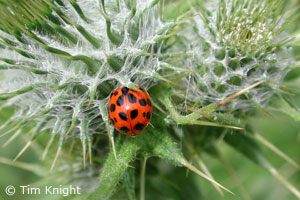

|
Ladybug Coccinellidae Beneficial insects. Lady beetles, ladybugs, or ladybird beetles are among the best known beneficial insects. Over 450 species are found in North America. Some are native to the United States and some have been introduced from other countries. Coccinellids are good insects. They feed on aphids or scale insects, which are pests in gardens, fields, and orchards. 
What they look like: Lady beetles are usually red or orange with black markings. Some lady beetles are black, often with red markings. Coccinellids are brightly colored to ward away potential predators. This defense works because most predators associate bright colors (like orange and black) with poison and a very bad taste. 
Lady beetle larvae are dark and alligator-like. They have six legs. They are spiny and black with bright spots. How big they are: These insects are about 1 cm long. The growing larvae range from 1 mm (1/25") to about 1 cm (3/8") in length. Where they live: The Ladybug is found throughout the United States. They can be found in open habitats including gardens, and fields. What they eat: They eat other insects. Lady beetles need to eat many aphids per day so that they can lay eggs. The Lady beetle larvae may eat its weight in aphids every day in order to grow. An adult Lady beetle can eat up to 50 aphids per day. Seven-spotted lady beetle adults (pictured above) may eat several thousand aphids in its lifetime. Each larvae eats 200 to 300 aphids as it grows. Introduced Species: One species found in the northwest is the multicolored Asian lady beetle, Harmonia axyridis, common in Japan, Korea and other parts of Asia. "Multicolored" refers to the color differences in this species, ranging from black with two red spots, to orange with 19 black spots, with every combination in between. This species was introduced by USDA scientists in the late 1970's and early 1980's to control insects. Did you know?

Asian Lady Beetle in an urban garden. Definitions:
Elytra - either of the front wings in beetles which cover and protect the hind wings Larvae - the immature free-living form of most invertebrates More Information Lady Beetles - Cornell University Lady Beetles - Washington State University Ladybugs - University of Kentucky Photo credits: photos © Tim Knight Home | About Us | How to Participate | Biodiversity Modules | Projects | Maps | News | Resources |